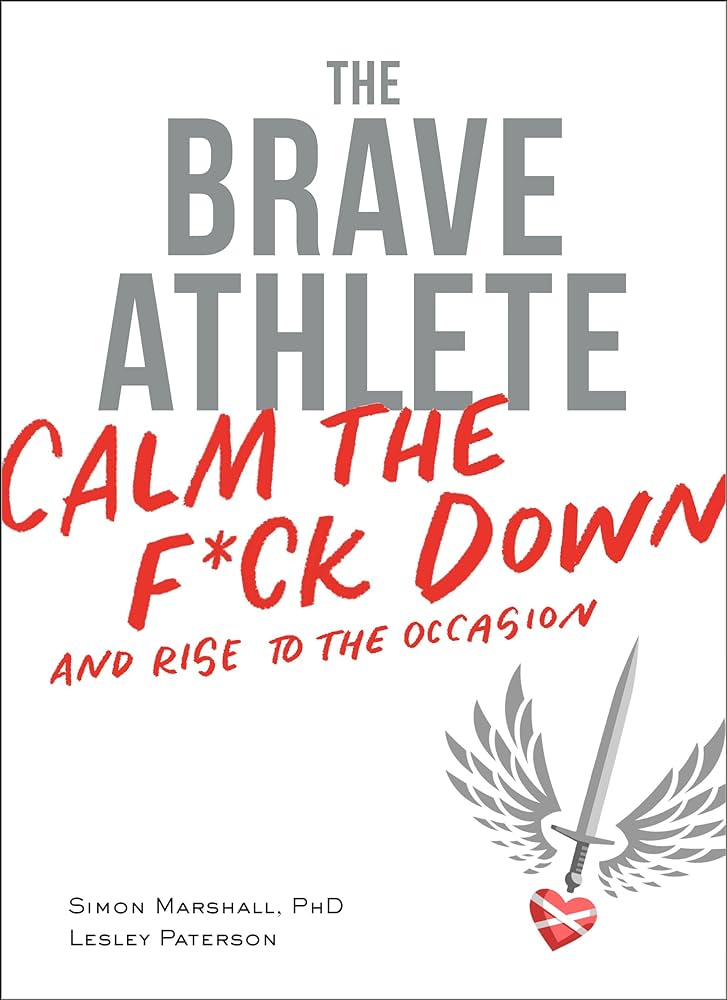In The Brave Athlete: Calm the F*ck Down and Rise to the Occasion, sports psychologist Dr. Simon Marshall and his wife, World Triathlon Cross Championships Lesley Paterson, describe the 13 most common mental conundrums athletes face in their everyday training and races.
At some point in our lives, we’ve all been told, “Be brave.” You probably first heard it from your mom or dad as you stood sobbing with a skinned knee, or when you realized that the large needle that the nurse was holding was headed for your arm. Being brave is about facing physical or mental discomfort with courage. And courage is the ability to act despite having thoughts and feelings that scream at you to run, hide, or freeze.
Being brave is not about acting without fear or anxiety. In fact, far from it. Being brave is about feeling fear and getting stuck in anyway.
Being an endurance athlete doesn’t actually require you to face real danger—you know, the kind in which fate hangs in the balance and lives are at stake. Real bravery is reserved for the people who put their own lives at risk to help others.
Elements of the brave athlete
Heart.
This is the passion and motivation that identify you as an athlete. It’s why you do what you do. Brave athletes aren’t perfect, but they know their “why,” believe in their ability, and know how to turn intentions into action.
Wings.
This is the ability to rise above obstacles, setbacks, and conflict. Brave athletes keep perspective whatever the circumstances, leverage a healthy attitude to make good choices, and manage the internal conflict that comes with challenge, social comparison, and judgment.
Fight
This is the ability to always give your best when it counts. Brave athletes engage in the internal battle of managing stress and anxiety, feeling competitive, staying focused under pressure, and being able to push through physical discomfort without giving up.
HEART: Hone your passion, motivation, and identity
It’s part of the human condition. We all come with some level of emotional baggage or strange reactions to silly things. The solutions to many of the psychological and emotional roadblocks presented in this book are attempts to clean up your operating system and install some virus protection software.
Your Professor brain deals with facts, truth, and logic. Your Chimp brain deals with feelings, impressions, and emotions, based on instincts and drives. Your Computer brain acts like a machine that takes orders from the Chimp or Professor and runs stored programs based on your experiences and memories so you don’t have to think too much. These brain systems all fight for control.
Learning how to calm the f*ck down and rise to the occasion is about recognizing which brain is in charge and then doing some brain wrangling to get the right brain for the job back in control.
WINGS: Deal with Obstacles, Setbacks, and Conflict
Mindfulness Training
The central feature of mindfulness is paying conscious attention to the distress itself, but instead of holding a pity party with only one guest, you resist the temptation to judge it. This means no more talk of “No one understands how hard this is” or “My season is totally ruined.” Just like gratefulness training, mindfulness can stage the neurochemical foundations of positive emotion and help build momentum to keep the positivity going.
Character cannot be developed in ease and quiet. Only through experience of trial and suffering can the soul be strengthened, ambition inspired, and success achieved.—HELEN KELLER
Our Comfort Zone
To avoid feeling embarrassed, humiliated, and inadequate, we create comfort zones. A comfort zone is simply a psychological fence that we erect around ourselves to protect something that we feel vulnerable about. The psychological fence emerges as a behavioral habit—actions we take to avoid the confrontation. You probably experience a lukewarm version of this on a regular basis: procrastination. Staying inside the fence gives us a sense of security and comfort—a predictableness that is calming.
Beyond the fence lies the unknown—which we assume is discomfort, fear, failure, and judgment. Under these circumstances, it’s no wonder that many people choose to avoid competing at all, or upgrading to a new performance category, trying a new distance, or entering a race they don’t feel fully prepared for.
Comfort zones are a normal adaptive response to keep the inner peace.
Recognize that actions can fail, but people cannot.
One of the biggest misjudgments that people make is equating a failed plan with a failed person. Plans fail. Actions fail. People are not failures. The critical point is what we do with our failed actions and plans (or the thought of failure). Do we learn from them? Do we ignore them?
Legit vs Shit Quit
Legit Quit
Not all quits are the same. Sometimes quitting is your best option. Quitting a bad relationship, quitting a job that makes you miserable, quitting midway through a training run because of injury pain. These are times when quitting is your brain’s way of saying, “I care about you. You deserve better.
Shit Quit
You know you’ve experienced a shit quit because it comes with a very deep-seated and private regret after you’ve bailed. Only you know which quit just happened. The trouble is, your brain desperately tries to rationalize both kinds of quitting because your brain’s priority is to reduce the dissonance and restore the comfort and contentment that comes from knowing that your thoughts match your actions.
Earning the brave life
Pursuing a brave life as an athlete is far more rewarding to emotional health, and certainly a lot more exhilarating, than life in the comfort zone. When you commit and act despite feeling a bit scared, when you side-step or clamber (however clumsily) over obstacles and setbacks, when you seek out adversity to learn from suffering, not despite it, and when you scour your world for tiny reminders of things to be grateful for in life, you are on your way. This is the life that strives to thrive, not just survive.”
The real challenge is that you must earn a brave life, not just learn about it or wish it.
All the Best in your quest to get better. Don’t Settle: Live with Passion.



Comments are closed.